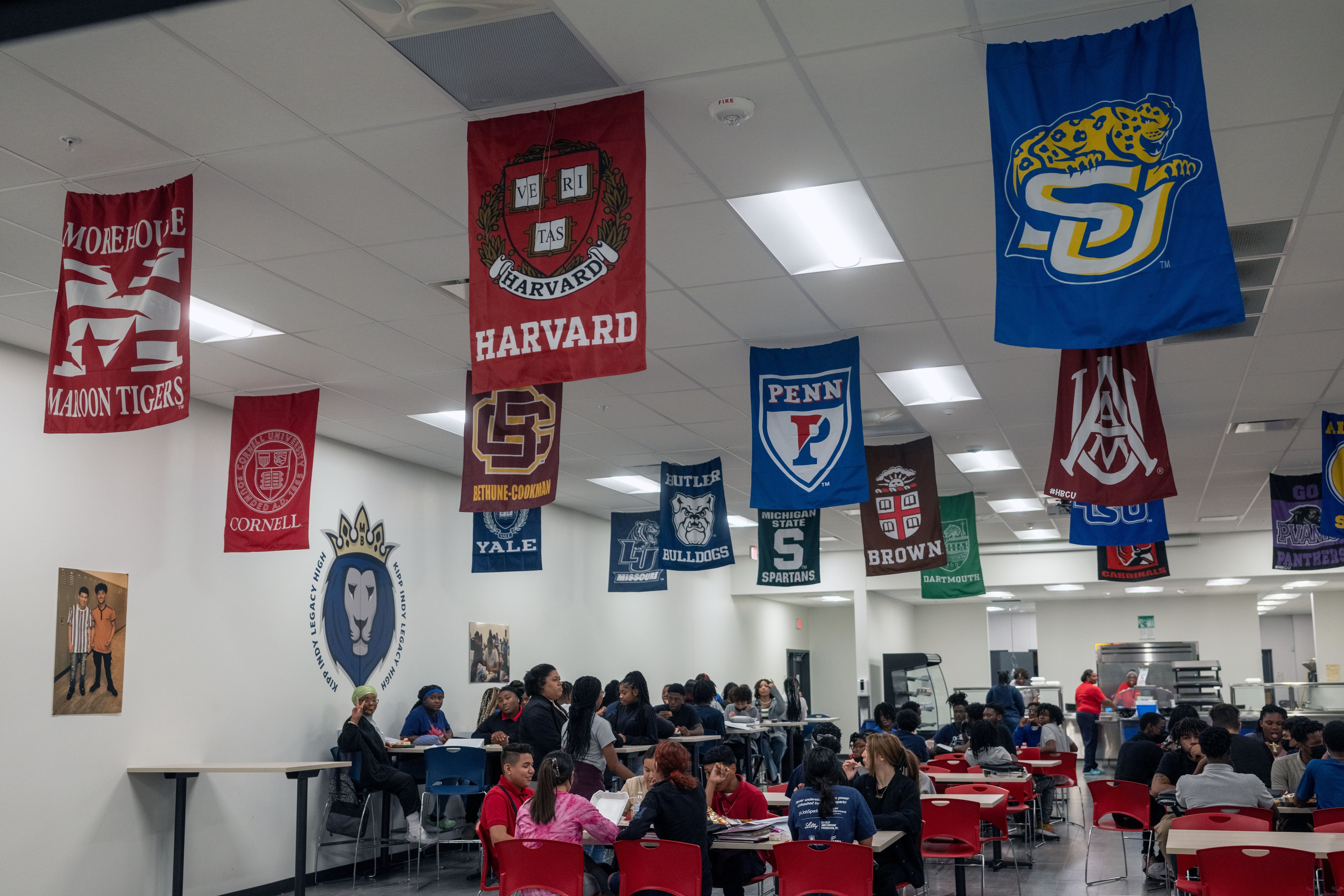With an eye to addressing Indiana’s low college-going rate and the perception that college is too expensive, Indiana leaders approved three new laws aimed at improving college access.
The new laws aim to strengthen a state scholarship program, provide more information about financial aid, and limit colleges’ power to withhold transcripts from those who still owe money to institutions.
In 2020, the most recent year for which data is available, the state’s college-going rate dropped to 53%, a decline of 12 percentage points from five years before. And there’s been a similar decline in adults who are looking for postsecondary opportunities, per the Indiana Commission for Higher Education.
Improving college-going is about the “removal of barriers,” said Alison Bell, chancellor at Western Governors University Indiana. “There are a lot of complicated reasons why the college going rate is low.”
Plus, the state is coming up on its 2025 deadline to have at least 60% of Hoosiers with a credential beyond high school. When state leaders set that goal in 2009, that number was 33%, said Indiana Higher Education Commissioner Chris Lowery in his 2023 State of Higher Education address. It now sits at 54%, but that includes the addition of certificates that were not originally counted, according to the commission.
Higher education leaders and advocates for these bills stressed that finances are a particularly big barrier for students when they don’t know what’s available to them to help them pay for college.
Here what you need to know about three new laws:
21st Century Scholars program expands
The 21s Century Scholars program offers up to the equivalent of four years tuition and regular fees at an in-state public university or college to students who meet income and residency eligibility, and follow requirements outlined in a scholar pledge.
Previously, students had to sign up for the scholarship in middle school, before a no-exceptions deadline of June 30 after eighth grade.
But with the new law, eligible students will automatically become part of the program. After that, students and their families can decide if they want to continue to meet requirements to stay in it. State data showed that 48% of eligible students enrolled.
“It expedites the process,” said Vincent Isom, director of 21st Century Scholars at Indiana University Bloomington, referring to the new law. He said that students and their parents are no longer dependent on finding out about an application and submitting it.
Students required to seek out financial aid options
Indiana students, with some exceptions, are now required to fill out the Free Application for Federal Student Aid, known as the FAFSA.
Advocates of the change said that millions of dollars in aid were being left on the table. Requiring the form would allow students to see their school funding options, they argued, and perhaps convince more students to enroll in postsecondary education.
The form is what students need to be considered for federal financial aid such as grants, loans, and scholarships. Completing the form is also considered a leading indicator of college-going.
States and colleges also use the FAFSA to determine eligibility for their respective aid programs.
Colleges can’t withhold transcripts
State and for-profit private colleges and universities can no longer refuse to provide transcripts to current or former students who still owe money — including fees and student loans — to the institution. They also can’t can’t charge a higher fee for the document for those who owe money.
This change removes a barrier for adult learners who want to finish their degrees, but still have payments to make. It often takes months for someone who is thinking about going back to school to make a decision, and not having access to a transcript can derail them, Bell said.
“When a student learns something, they’ve learned it,” said Bell, who advocated in favor of the change. “Withholding a transcript only removes the university’s verification that they’ve learned it.”
Improvements in college access, but more needed
While higher education experts agree these changes are a big step forward, they said that having the money to go to college is only one piece of access.
Access means having information and resources, not only as students are entering college, but also as a college student, said Maurice Shirley, an assistant professor in higher education and student affairs at IU.
He said that includes knowing things like what applications to fill out and where to find them, housing options, and what is needed for a major or to switch majors. And the information to students needs to be targeted and easy to find, said Shirley, given that there can be an information overload.
The change to automatically sign up students for 21st Century Scholars, the change isn’t a “magic wand,” Isom noted. But he said the new law will allow him and others to work with students to spend more time on benchmarks and staying successful in college, instead of on the scholarship application.
And the information to students needs to be targeted and direct, said Shirley who said there is information overload, so the easier it is to find answers to questions, the better.
Both Isom and Shirley agreed finances is an area that they want to see more improvement.
Isom said that students need to be prepared to handle their finances both during and after college.
Shirley said costs of college still need to be lower. One option is addressing tuition costs. But a second way, he said, is decreasing or providing aid for the fees that come with the tuition bill, from activity fees and housing to general living expenses like groceries, health care and so on, he said.
Gone are the days that a student could afford to pay their way through college by working a summer job and using that money during the school year, he added.
MJ Slaby oversees Chalkbeat Indiana’s coverage as bureau chief and covers higher education. Contact MJ at mslaby@chalkbeat.org. Chalkbeat Indiana partners with Open Campus on higher education coverage.






